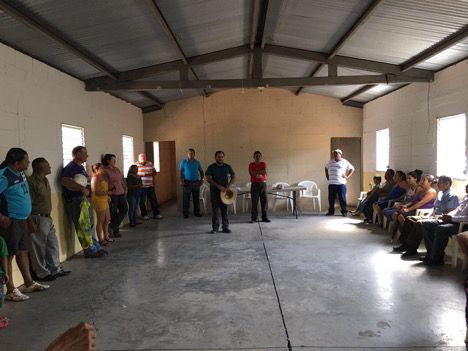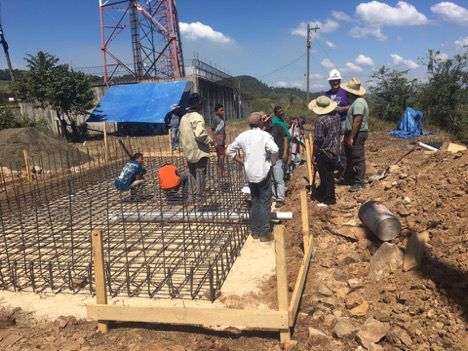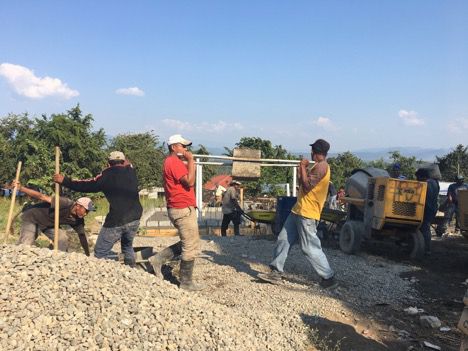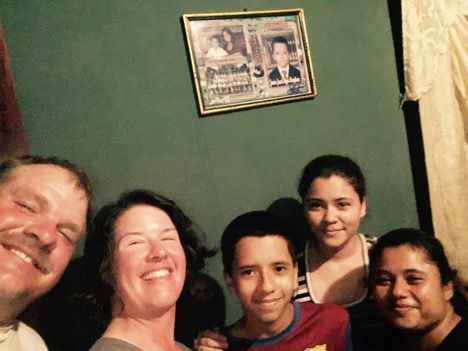Higuerito is a poor but growing community in Honduras, located about 193km from the capital of Tegucigalpa and about 58km from the urban center of San Pedro Sula. The community was originally located on the other side of the hill from its current location. However, in 1998, hurricane Mitch came through and destroyed the original community, which forced inhabitants to relocate their lives to its current location. While the new community was well planned, it was built in a hurry to provide emergency housing for the city’s population which was homeless after hurricane Mitch. The current water system was designed by the NGO Organismo Cristiano de Desarrollo Integral de Honduras (OCDIH) for 80 households in the community. Since that time, Higüerito Central has grown to 369 current households, with an anticipated total of about 400 to be implemented in various stages of development and construction. It has a leaky, vulnerable, but functioning distribution system which provides half of the current water demand. The current source is surface water from a stream 4km away that is heavily contaminated with municipal and industrial waste. The town rations water so that half the community receives water from 6am to 12pm, and the remaining half from 1pm to 6pm. During this allotted time, people fill up their pilas (large open basins of water with a side compartment for washing clothes and dishes) and/or tanks.
 Javier Andrade of EWB-SFP speaking to the Community at start of trip.
Javier Andrade of EWB-SFP speaking to the Community at start of trip.
Engineers Without Borders (EWB)-San Francisco Professional Chapter partnered with Salinas Northeast Rotary Club, Salinas Steinbeck Rotary Club and host Rotary Club of San Pedro Sula for a global grant to provide a solution. EWB prides itself on finding engineering solutions that are sustainable, financially attainable, and culturally appropriate. Multiple assessment trips were mobilised with volunteer engineers to conduct feasibility studies evaluating water source alternatives, community capability, topography and availability of construction materials/equipment. At the start of the project, the village was not on the country’s electrical grid, and with the community size, it was deemed more economical and faster to obtain raw surface water than to drill a well and force the residents to support a substantial fuel bill. Due to the limited financial assets within the community, EWB-SFP fundraised for the installation of a groundwater well with a 1,000gpm capacity. The well will be pumped to storage tanks serving each of the three community sectors and then through the distribution system to the community.
 Javier Andrade and Mike Paddock of EWB assisting the Community installing formwork for the concrete slab tank foundation.
Javier Andrade and Mike Paddock of EWB assisting the Community installing formwork for the concrete slab tank foundation.
Utilising the skill set of engineers is invaluable for global water development. Water sanitation projects can get a head start in anticipating issues such as sanitation, efficiency, durability, maintenance, pressure fluctuation, extreme weather considerations and capacity with engineers as part of the team. Having detailed construction plans not only gives the project a clear direction and sequence, but also serves as a tool for in-country community collaboration. We are extremely grateful to Rotary which has multiple engineers and skilled masons within the community to provide feedback. Our first implementation trip completed in February was wildly successful due to vital collaboration with the community and Rotary partner. There were some design components requested to be modified to preferred Honduran construction methodologies. By having an EWB structural engineer on the travel team, we facilitated the review of these modifications and determined them still structurally sound on the spot. We completed nearly two concrete cinder block tanks in two short weeks! Three remaining tanks are in construction, providing for total storage for 116,667 gallons of readily accessible water!
 Community members manually loading material into concrete mixer for foundation.
Community members manually loading material into concrete mixer for foundation.
Next up is the design upgrade to the existing distribution system! When completed, we will be providing a reliable, clean and sustainable water source to as many as 2,300 thousand people within the community of Higuerito Central and downstream communities. Throughout the project, we have assisted the community with developing a Water Committee that will manage the finances and be responsible for the O&M of the system. This project has not contributed to realising the Human Right to water, but has also helped empower the community.
About the Author:
Erin Kelly is an environmental scientist and works for E2 Consulting Inc. in Emeryville, CA. She is also the Project Manager for the EWB-SFPC Honduras team.
 Erin Kelly and Mike Paddock with host family in the community.
Erin Kelly and Mike Paddock with host family in the community.
By Erin Kelly; Engineers Without Borders – San Francisco Professional Chapter.